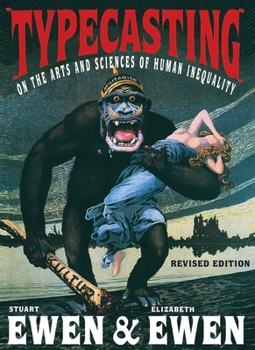Typecasting: On the Arts & Sciences of Human Inequality
Select Format
Select Condition 
Book Overview
Typecasting chronicles the emergence of the "science of first impression" and reveals how the work of its creators--early social scientists--continues to shape how we see the world and to inform our most fundamental and unconscious judgments of beauty, humanity, and degeneracy. In this groundbreaking exploration of the growth of stereotyping amidst the rise of modern society, authors Ewen & Ewen demonstrate "typecasting" as a persistent cultural practice. Drawing on fields as diverse as history, pop culture, racial science, and film, and including over one hundred images, many published here for the first time, the authors present a vivid portrait of stereotyping as it was forged by colonialism, industrialization, mass media, urban life, and the global economy.
Format:Paperback
Language:English
ISBN:1583227768
ISBN13:9781583227763
Release Date:January 2008
Publisher:Seven Stories Press
Length:544 Pages
Weight:2.25 lbs.
Dimensions:1.1" x 6.6" x 9.2"
Customer Reviews
3 ratings
"Every way of seeing is also a way of not seeing." --H.M. Lynd
Published by Thriftbooks.com User , 16 years ago
Why do we typecast? If you're a thoughtful person, you can probably come up with a reasonable response: Typecasting helps us sort through information quickly. The cowboy in the white hat will be the good guy, the blonde will be an airhead, the black person will be...President of the United States? Even to argue that there is every good reason for the black person to be president is to acknowledge the extent to which typecasting affects our thinking. But isn't it useful to be able to sort through information quickly? Isn't that why typecasting evolved to begin with? Certainly, it's important to recognize friend or foe quickly and take action, especially if our senses register "foe." And we are able to recognize foes quickly because their stereotypes have been defined. Thus, we are easily able to avoid getting on the plane with that Middle Eastern group; in fact, perhaps the airline will refuse to allow them to board. What? They're actually US-born citizens? Well, that'll teach them to walk around looking like Muslims, won't it? Oh...they are Muslims? Well, the airline officials were simply responding to the established research that helps them identify terrorists. "Typecasting: On the Arts and Sciences of Human Inequality," takes us right to the heart of that research. Typecasting did not evolve as science documented what we know about stereotypes; what we think we know about stereotypes has driven the (so-called) scientific documentation. "Typecasting" leads the reader from curiosity cabinets to physiognomy, on through phrenology (with its skull charts documenting everything from breathing power to parental love) and body typing, which makes it possible to identify criminals, dullards, and perverts at a glance (just think how useful that's going to be at your office!) At turns laughable - the Hottentot Venus, an African woman thought to be a missing link between human and orangutan based on the shape of her genitalia; and horrific - her labia were removed and preserved in formaldehyde - Ewen and Ewen take us through the history of the sham sciences that result in typecasting, from Adam and Eve to today's headlines. Your thinking will be challenged, your world view will be expanded, and you'll question what you "know" about art, science, journalism, advertising, and more - a pretty good payoff for reading this remarkable book!
An absolute "must-have" for sociology shelves
Published by Thriftbooks.com User , 18 years ago
Co-written by recognized consumer culture historian Stuart Ewen, Typecasting: On the Arts and Sciences of Human Inequality is a plain-terms, no-holds-barred look at the long-running practice of science warped to serve prejudice. Though the word "typecasting" refers to a common practice in cinema and mass-media to pick certain types of actors for certain roles, Typecasting covers discrimination in all aspects of human society. From Johann Friedrich Blumenbach, King George's court physician who subdivided humanity into five unequal categories during the Declaration of Independence era, to early twentieth-century birth control advocate Margaret Sanger's view of birth control as a means to curb the procreation of "socially degenerate" populations "unfit" for democracy, to the 2005 president of Harvard University's claim that "issues of intrinsic aptitude" explain the under representation of women in the sciences and mathematics, Typecasting leaves no stone unturned from ancient taxonomies of human difference to modern-day battlegrounds of ideas. Of particular interest is the elucidation of how religion is often dragged into prejudice, with inequality or second-class citizenship depicted as God's will in past centuries and the current century. An absolute "must-have" for sociology shelves, enthusiastically recommended for public and college libraries alike.
This is a great book!
Published by Thriftbooks.com User , 18 years ago
This book really illuminated a lot for me. It's a great history of stereotyping, and while I was reading it everyday I would see current newstories and television shows that related to this book, and that this book really helped illuminate for me. Ewen and Ewen are great writers as well, they tell their story very grippingly. I would definitely reccomend this for anyone who's interested in knowing how we got to where we are in the history of race/religion/etc., and anyone who's just looking for a good, intelligent read. Ewen and Ewen have done a fantastic job.





